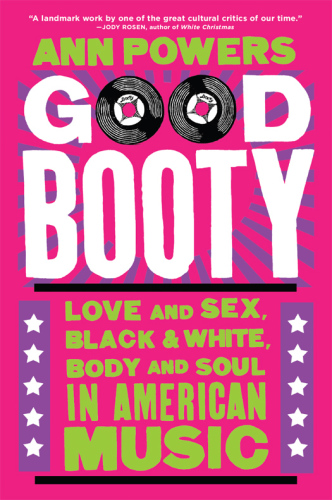
Good Booty
Love and Sex, Black and White, Body and Soul in American Music
کتاب های مرتبط
- اطلاعات
- نقد و بررسی
- دیدگاه کاربران
نقد و بررسی

June 12, 2017
In her ambitious history of American pop music, NPR critic and correspondent Powers delves into a diverse range of music forms including Creole love songs and tracks to twerk to on MTV. Above all, Powers (Weird like Us) embraces the profound, and often illicit, influence African-American music had on mainstream culture. Beginning her book in early 19th-century New Orleans, Powers examines the exotic appeal of the city’s diverse cultures on the divided nation that absorbed it. From there she speeds through two centuries of music including ragtime, gospel, R&B, rock and roll, punk, disco, and hip-hop, focusing on artists and genres that transformed the way people move on the dance floor and in the bedroom. The sweeping themes and expansive time span make for a daunting endeavor, one that Powers further complicates by tackling big related topics such as marriage and the internet. Broad overviews of musical eras highlight important artists, some well-known (Elvis, Hendrix, Madonna, Beyoncé), others less so (Florence Mills, Dorothy Love Coates, Tribe 8). Powers alternates between basic Wikipedia-level historiography and academic theorizing, focusing on the interchanges between song, identity, and the body. Powers’s inevitable neglect of dominant genres (swing-era jazz) and essential figures (James Brown) exposes the impossibility of her undertaking. Still, as an introduction to the racially and sexually charged legacy of pop music in the U.S., this book is well worth a spin.

June 1, 2017
Forget drugs: sex and rock & roll are where it's at in this survey of the devil's music and its carnal dimensions.NPR music critic Powers (Weird Like Us: My Bohemian America, 2000, etc.) opens on a political note, observing, "America's erotic drive emerged as inseparable from the fact of its troubled multiculturalism." Take it as a given that nations have "erotic drives" and that any discussion of "American bodies" requires us to acknowledge "the legacy of gross inequality that begins in the enslavement of Africans." The author then settles into her occasionally diffuse narrative that connects Congo Square to Beyonce and bemoans the devolution of Ma Rainey's bawdy to the pornified, auto-tuned hip-hop of today. Where Powers successfully connects the dots, light bulbs flash: it is fascinating to watch her join the gay subculture of disco to the success of the sisters Labelle, nee the Blue Bells, remade in "a previously unexplored space where glam met funk met soul via strictly female interplay." (Well, perhaps not strictly female, since, as Powers notes, the designer of Labelle's outrageously flamboyant costumes went on to invent the costumes of the swaggering cartoon band KISS.) Even where she does not successfully make those connections, as with her notes on the apache ("pronounced A-POSH, not like the Native American tribal name") dance and its not-so-subtle masochism, which never quite caught on in the larger culture, she ventures interesting theses. Mostly, the author strings together bright tidbits of cultural trivia to reconstruct and deconstruct the kinship of dirty blues and gospel, the shared underage girlfriends of now-iconic British rock stars, and other points of prurient interest. A mixed bag, sometimes entertaining, sometimes arid, but full of useful insights; readers won't look at Lady Gaga or Nicki Minaj the same way after considering them among the "cartoonish card deck of sexualized female archetypes" that constitutes so much of the present pop scene.
COPYRIGHT(2017) Kirkus Reviews, ALL RIGHTS RESERVED.

Starred review from June 15, 2017
From Britney Spears's manufactured sex appeal to Jim Morrison's toxic masculinity, NPR music critic Powers (Piece by Piece; Weird Like Us: My Bohemian America) explores the intersection between America's musical landscape and its overwrought cultural views of sex. She opens with a meditation on the interplay between body and sound crystallized in New Orleans' Congo Square in the 19th century. Here, confluences of African and European musical styles blended to create the roots of jazz and what would become rock and roll. As a corollary, popular music became an amalgam of racial tension, sexual expression, and gender expectations that continue to reverberate into the new millennia. From Miley Cyrus's twerking to Beyonce's "Formation," Powers articulates how artists have manipulated or experimented with each of these threads to forge their own musical identity and sound. VERDICT With precision and wit, and across multiple musical genres, Powers contextualizes the complicated interplay of gender, sex, and race inherent in popular music within and against the backdrop of America's puritanical founding.--Joshua Finnell, Los Alamos National Lab., NM
Copyright 2017 Library Journal, LLC Used with permission.

























دیدگاه کاربران